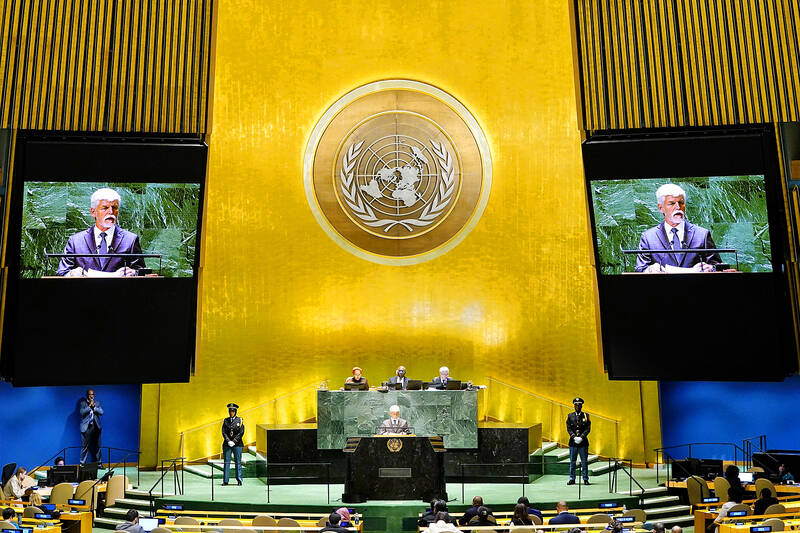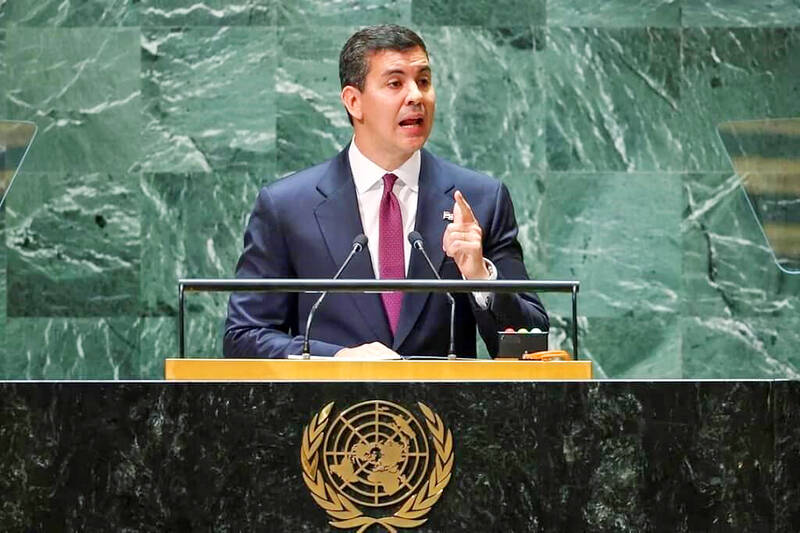The leaders of three diplomatic allies — Guatemala, Paraguay and Palau — on Tuesday voiced support for Taiwan’s inclusion in the UN on the first day of the UN General Debate in New York.
In his address during the 78th UN General Assembly, Palauan President Surangel Whipps Jr urged the UN and all parties involved in cross-strait issues to exercise restraint and seek a peaceful resolution.
“The well-being and prosperity of nations and their economies are intrinsically linked to global peace and stability,” he said.

Photo: AP
He also thanked partner nations such as Taiwan, Australia, Japan and the US for providing assistance and training opportunities to help Palauans upskill.
“We also advocate for change regarding the Republic of China, Taiwan, being unjustly excluded from UN systems, despite its remarkable leadership and innovative solutions,” he said, adding that the global organization should allow Taiwan to participate in crucially important agencies, because it has much to offer.
Citing the UN Charter, which affirms the equal rights of all people and nations, Whipps called on the UN to uphold that vision by allowing Taiwan to participate and contribute.

Photo: Reuters
Outgoing Guatemalan President Alejandro Eduardo Giammattei made a similar plea during his address.
He said that the UN should recognize the importance of “inclusivity and universality.”
“How can it be that in the 21st century, this organization has excluded a country like Taiwan? A country that contributes to science, technology, health and development; but yet we exclude its citizens from having a voice in this forum,” he said.
He urged the UN “to exhaust all measures that are necessary to guarantee international peace and security in the Taiwan Strait.”
Paraguayan President Santiago Pena, who assumed the presidency last month, expressed his government’s support of Taiwan as “an integral part of the United Nations system.”
Also on Tuesday, Czech President Petr Pavel, who is making his first appearance at the UN General Assembly since assuming office in March, criticized the People’s Republic of China (PRC) for its military maneuvers in the Taiwan Strait.
“We deplore China’s military actions which have raised tensions in the Taiwan Strait, as well as its unfriendly action against partners in the South China Sea. Any disputes or contentious issues must be solved peacefully. Any potential armed conflict in the region would have negative consequences on the whole world,” Pavel said.
It marks the second consecutive year a government representative from the Czech Republic has raised such concerns at the UN General Assembly.
Last year, a plea for cross-strait peace was made by Czech Minister of Foreign Affairs Jan Lipavsky.
The leaders of two more diplomatic allies, Eswatini and the Marshall Islands, were scheduled to make their addresses at the General Debate yesterday.
Taipei previously said that it had asked its 13 diplomatic allies, as well as like-minded nations, to voice support for its inclusion in the UN system, either by speaking up during the General Assembly or sending a letter to UN Secretary-General Antonio Guterres.
Several side events have also been launched by the Taipei Economic and Cultural Office in New York and a delegation of Taiwanese lawmakers visited the city to advocate for Taiwan’s inclusion in the UN.
Taiwan left the UN in 1971 and it has since been excluded from its special agencies.

A Ministry of Foreign Affairs official yesterday said that a delegation that visited China for an APEC meeting did not receive any kind of treatment that downgraded Taiwan’s sovereignty. Department of International Organizations Director-General Jonathan Sun (孫儉元) said that he and a group of ministry officials visited Shenzhen, China, to attend the APEC Informal Senior Officials’ Meeting last month. The trip went “smoothly and safely” for all Taiwanese delegates, as the Chinese side arranged the trip in accordance with long-standing practices, Sun said at the ministry’s weekly briefing. The Taiwanese group did not encounter any political suppression, he said. Sun made the remarks when

The Taiwanese passport ranked 33rd in a global listing of passports by convenience this month, rising three places from last month’s ranking, but matching its position in January last year. The Henley Passport Index, an international ranking of passports by the number of designations its holder can travel to without a visa, showed that the Taiwan passport enables holders to travel to 139 countries and territories without a visa. Singapore’s passport was ranked the most powerful with visa-free access to 192 destinations out of 227, according to the index published on Tuesday by UK-based migration investment consultancy firm Henley and Partners. Japan’s and

BROAD AGREEMENT: The two are nearing a trade deal to reduce Taiwan’s tariff to 15% and a commitment for TSMC to build five more fabs, a ‘New York Times’ report said Taiwan and the US have reached a broad consensus on a trade deal, the Executive Yuan’s Office of Trade Negotiations said yesterday, after a report said that Washington is set to reduce Taiwan’s tariff rate to 15 percent. The New York Times on Monday reported that the two nations are nearing a trade deal to reduce Taiwan’s tariff rate to 15 percent and commit Taiwan Semiconductor Manufacturing Co (TSMC, 台積電) to building at least five more facilities in the US. “The agreement, which has been under negotiation for months, is being legally scrubbed and could be announced this month,” the paper said,

MIXED SOURCING: While Taiwan is expanding domestic production, it also sources munitions overseas, as some, like M855 rounds, are cheaper than locally made ones Taiwan and the US plan to jointly produce 155mm artillery shells, as the munition is in high demand due to the Ukraine-Russia war and should be useful in Taiwan’s self-defense, Armaments Bureau Director-General Lieutenant General Lin Wen-hsiang (林文祥) told lawmakers in Taipei yesterday. Lin was responding to questions about Taiwan’s partnership with allies in producing munitions at a meeting of the legislature’s Foreign Affairs and National Defense Committee. Given the intense demand for 155mm artillery shells in Ukraine’s defense against the Russian invasion, and in light of Taiwan’s own defensive needs, Taipei and Washington plan to jointly produce 155mm shells, said Lin,